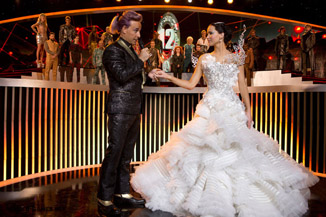Movie Review: Catching Fire
By Matthew Huntley
November 27, 2013
BoxOfficeProphets.com

The Hunger Games: Catching Fire, as a movie anyway (I have not read Suzanne Collins’ popular novels), mostly abandons this approach to the material. It’s taken the characters’ dire situation and sensationalized it, almost to the point where we’re supposed to think of it as fun, like an actual game, and it functions not to make us shudder at the idea of taking part in a competition where we have to kill our fellow man, but rather cheer or laugh at it the way we might a battle between superheroes.
This is most evident in a scene where the two victor tributes from the last Hunger Games, Katniss Everdeen (Jennifer Lawrence) and Peeta Mellark (Josh Hutcherson), are schooled by their mentor, Haymitch (Woody Harrelson), about their latest competition. The roster includes, among others, a merciless brother-sister fighting team; a male warrior who sports a trident; a scientist-electrician who’s very skilled with wire; an older woman with a gift for making fishhooks; and a barbarous female who’s altered her teeth to be razor-sharp so she can rip out people’s throats. This should give you an idea of how the Hunger Games is steering away from a raw, more realistic approach to its themes toward a more colorful, stylized and action-oriented one.
Is this new direction a bad one? Not necessarily, because as it is, Catching Fire is still entertaining, has high energy and is rather inventive with the new hurdles it puts in front of its characters.
What are the new hurdles? You’ll recall from the first movie both Katniss and Peeta walked away victors of the 74th Annual Hunger Games, which is an aberration since there’s always just been one champion. They did this by threatening to commit suicide unless they both could live. The media essentially deems them “Panem’s Sweethearts” (Panem is the name of the futuristic world’s last remaining country) because it’s assumed they did this in the name of love, but the reigning Capitol government and President Snow (Donald Sutherland) aren’t happy with the way things turned out and fear that members of the 12 districts will discover the kids’ star-crossed relationship was just a ruse and therefore the government is capable of being subverted. Snow demands that Katniss and Peeta, while on their victory tour, convince the districts otherwise and that their decision really did stem from passion, thus calming a potential rebellion.
When this doesn’t work, Snow employs the games’ new overseer, Plutarch Heavensbee (Philip Seymour Hoffman), to carry out a new provision for the games’ upcoming Quarter Quell, which takes place every 25 years. For the 75th Annual Hunger Games, the new rule stipulates the contestants will be comprised of the still-existing group of victors. This way, President Snow ensures one of District 12’s living victors - Katniss or Peeta - will end up dead.
The event once again takes place in a giant dome, this time in a tropical setting, where everything, from trees to animals to lightning strikes, is able to be manipulated by a team of engineers. Heavensbee is the technical director and he carries out Snow’s wishes to see that many of the tributes are killed off swiftly. To extend their life lines, Katniss and Peeta ally with the two victors from District 4, the aforementioned trident wielder named Finnick (Sam Caflin) and the talented mute-hunter named Mags (Lynn Cohen). They also team up with Beetee (Jeffrey Wright) and Wires (Amanda Plummer) from District 3, as well as Johanna (Jena Malone) from District 7, who’s neither shy about her body nor her disdain for the president.
Even if you haven’t read the books, just as I haven’t, Catching Fire more or less plays out like a big-budget Hollywood sequel, and it’s therefore just as accessible and capable of exciting us, which it does quite well. The action and special effects have been heightened since the first movie and events are set in motion that puts the series on course for its grand finale, which, like most franchises these days, is being split into two parts.
But despite its entertainment value, we can’t help but think the franchise has taken the easier and more superficial route toward pleasing its audience rather than really honing in on its deeper themes, which include restricted freedom, persecution, and the human race’s obsession with violence, and the increasing gap between the rich and poor. Examining these notions through dialogue instead of simply upping the spectacle would have made “Catching Fire” more challenging and substantive.
From here on out, The Hunger Games series seems destined to focus on its safer and more familiar dramatic elements, like love triangles - Katniss still can’t decide who she loves more: Peeta or Gale (Liam Hemsworth); revenge; secrets; double-crossings, etc. The movies appear to favor the juicy stuff over the ideas that might actually make the audience deliberate its moral issues. But this also seems to be what most people want, which isn’t the same as what people need.